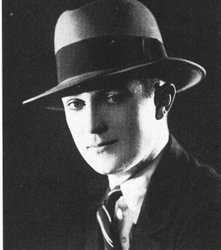Rex Cherryman est un Acteur Américain né le 30 octobre 1896 à Grand Rapids (Etats-Unis)

Rexford Raymond "Rex" Cherryman (October 30, 1896 – August 10, 1928) was an American actor of the stage and screen whose career was most prolific during the 1920s.
Born in Grand Rapids, Michigan, Rex Cherryman attended Colgate University, (Hamilton, New York) in 1915-1916. He transferred to the University of Michigan (Ann Arbor) in 1916. There he met fellow student Esther Louise Lamb. Esther and Rex were married February 9, 1918. They had one son, Rexford Raymond Cherryman, Jr., born October 10, 1925. Rexford, Jr. married Beatrice Wishard in 1950. They had two daughters: Ann Elizabeth Cherryman (born 1951) and Constance Lamb Cherryman (born 1954).
Cherryman began his film career appearing in the 1919 comedic film In For Thirty Days as Count Dronsky, opposite popular leading lady of the silent film era, May Allison. The following year, Cherryman was chosen by the notable screen diva Alla Nazimova to appear opposite her as Thorne, in her penned dramatic film Madame Peacock. Cherryman and Nazimova developed a friendship and at Nazimova's request, he was cast in the role Gaston Rieux in the 1921 film that would possibly become his most recalled performance - 1921's Metro Pictures Corporation film adaptation of the Alexandre Dumas, fils novel La Dame aux Camélias, retitled as Camille. The film was an enormous critical and public success, placing Cherryman directly in the public consciousness. The film also starred Rudolph Valentino, Nazimova and Patsy Ruth Miller. Cherryman also appeared in the 1923 film Sunshine Trail in the role of Willis Duckworth. Cherryman's last film performance was a small role in the 1928 film Two Masters.
In addition to films, Cherryman was frequently involved with Broadway and various summer stock productions including the Denham Theatre in Denver, and the Aladdin Theatre in San Francisco, where he first met Barbara Stanwyck. He made several notable appearances on the stage. Among them were the musical comedy Topsy and Eva which ran from 1924 through 1925, The Valley of Content in 1925, and the Willard Mack penned drama The Noose, which ran from 1926 through 1927. While performing in the The Noose, Cherryman had an affair with fellow cast member Stanwyck. The Noose would subsequently become one of the biggest hits of the season and help launch Stanwyck's career. Cherryman's last stint on Broadway was a starring role in the 1927 dramatic production of The Trial of Mary Dugan opposite actor Robert Cummings at the National Theatre.
In August 1928, while sailing to France to read for a play in Paris, Cherryman contracted septic poisoning and died in Le Havre, France at the age of 31. His body was returned to Hollywood. His cremated remains are at Forest Lawn Memorial Park, Glendale, California. Esther's remains are in the same vault.
Source : Wikidata
Rex Cherryman

- Infos
- Photos
- Meilleurs films
- Famille
- Personnages
- Récompenses
Nom de naissance Rexford Raymond Cherryman
Nationalité Etats-Unis
Naissance 30 octobre 1896 à Grand Rapids (Etats-Unis)
Mort 11 aout 1928 (à 31 ans) à Le Havre (France)
Nationalité Etats-Unis
Naissance 30 octobre 1896 à Grand Rapids (Etats-Unis)
Mort 11 aout 1928 (à 31 ans) à Le Havre (France)
Rexford Raymond "Rex" Cherryman (October 30, 1896 – August 10, 1928) was an American actor of the stage and screen whose career was most prolific during the 1920s.
Born in Grand Rapids, Michigan, Rex Cherryman attended Colgate University, (Hamilton, New York) in 1915-1916. He transferred to the University of Michigan (Ann Arbor) in 1916. There he met fellow student Esther Louise Lamb. Esther and Rex were married February 9, 1918. They had one son, Rexford Raymond Cherryman, Jr., born October 10, 1925. Rexford, Jr. married Beatrice Wishard in 1950. They had two daughters: Ann Elizabeth Cherryman (born 1951) and Constance Lamb Cherryman (born 1954).
Cherryman began his film career appearing in the 1919 comedic film In For Thirty Days as Count Dronsky, opposite popular leading lady of the silent film era, May Allison. The following year, Cherryman was chosen by the notable screen diva Alla Nazimova to appear opposite her as Thorne, in her penned dramatic film Madame Peacock. Cherryman and Nazimova developed a friendship and at Nazimova's request, he was cast in the role Gaston Rieux in the 1921 film that would possibly become his most recalled performance - 1921's Metro Pictures Corporation film adaptation of the Alexandre Dumas, fils novel La Dame aux Camélias, retitled as Camille. The film was an enormous critical and public success, placing Cherryman directly in the public consciousness. The film also starred Rudolph Valentino, Nazimova and Patsy Ruth Miller. Cherryman also appeared in the 1923 film Sunshine Trail in the role of Willis Duckworth. Cherryman's last film performance was a small role in the 1928 film Two Masters.
In addition to films, Cherryman was frequently involved with Broadway and various summer stock productions including the Denham Theatre in Denver, and the Aladdin Theatre in San Francisco, where he first met Barbara Stanwyck. He made several notable appearances on the stage. Among them were the musical comedy Topsy and Eva which ran from 1924 through 1925, The Valley of Content in 1925, and the Willard Mack penned drama The Noose, which ran from 1926 through 1927. While performing in the The Noose, Cherryman had an affair with fellow cast member Stanwyck. The Noose would subsequently become one of the biggest hits of the season and help launch Stanwyck's career. Cherryman's last stint on Broadway was a starring role in the 1927 dramatic production of The Trial of Mary Dugan opposite actor Robert Cummings at the National Theatre.
In August 1928, while sailing to France to read for a play in Paris, Cherryman contracted septic poisoning and died in Le Havre, France at the age of 31. His body was returned to Hollywood. His cremated remains are at Forest Lawn Memorial Park, Glendale, California. Esther's remains are in the same vault.
Le plus souvent avec
Filmographie de Rex Cherryman (2 films)
Acteur

La Dame aux camélias (1921)
, 1h12Origine Etats-Unis
Genres Drame, Romance
Thèmes Maladie, Sexualité, Erotique, Prostitution, Adaptation d'une pièce de théâtre, Thriller érotique, Prostituée de fiction
Acteurs Rudolph Valentino, Alla Nazimova, Rex Cherryman, Arthur Hoyt, Patsy Ruth Miller, Zeffie Tilbury
Rôle Gaston Rieux
Note64%





Armand Duval, un jeune bourgeois, tombe amoureux de Marguerite Gautier, une courtisane parisienne atteinte de tuberculose qui porte régulièrement des camélias de couleurs à son buste. Alors qu'Armand a finalement réussi à convaincre Marguerite de quitter sa vie de débauche et de partir vivre à la campagne avec lui, son père oblige Marguerite à rompre avec son fils, afin de préserver le mariage de sa fille. De retour à Paris, vivant désormais dans le secret son amour pour Armand, Marguerite Gautier meurt finalement dans son lit, seule et ruinée.

Madame Peacock (1920)
Origine Etats-Unis
Genres Drame
Acteurs Alla Nazimova, John Steppling, William Orlamond, Rex Cherryman, Gertrude Claire
Rôle Thorne
Note60%





 Connexion
Connexion




